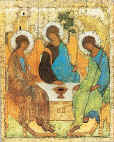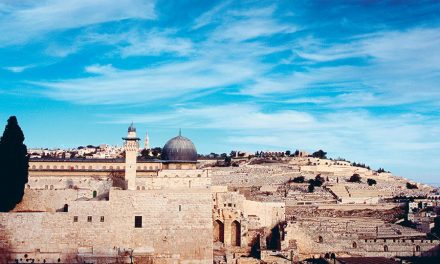Exodus 34: 4b-6, 8-9
Daniel 3: 52-56
2 Corinthians 16:11-13
John 3: 16-18
Remember how at just about every major sporting event in the 1980’s there was always that crazy guy holding up a sign that read “John 3:16”? 
He almost always found his way into the best camera angles at the Super Bowl, the Master’s, the NBA finals, even the Olympics, and of course he inspired some followers – to the point of quarterback Tim Tebow leading the Florida Gators to a BCS championship in 2009 with “John 3:16” written in the black paint under his eyes.
Well, the guy who started this phenomenon had a name – Rollen Stewart – and he got his start by wearing that crazy clown wig in order to be seen on camera at basketball games. But then he had a conversion experience watching a televangelist in a hotel room after a sporting event, and he combined his antics with a little evangelization of his own. He spent the years 1977 to 1992 traveling the world getting himself and his sign – “John 3:16” – onto the scene at just about every major sporting event one could imagine. He went so far out of his way to put up his sign, convinced that he had a mission from God to spread the Gospel in this way, that he eventually went completely broke and a little off the deep end – finishing his TV career with a hostage situation in L.A. that ended with a SWAT team and Stewart in prison.
In the readings for this week, God also goes pretty far out of God’s way to get our attention and show us some signs about God’s inner Trinitarian nature as Father, Son, and Holy Spirit – the three Persons of the one Divine essence. Given that Judaism and Christianity are historical religions, we believe that the full nature of God’s Trinitarian life was revealed through a series of signs that the Church has reflected upon for hundreds of generations in order to come to a fuller – though never complete – knowledge of the three persons in one essence of God’s nature.
At the most basic level, there is the sense in which everything in creation cries out in witness to God’s goodness – we find this reflected in the beautiful hymn of the three young men in the book of Daniel. Here we find all of the natural world crying out and blessing the Lord. This is what theologians would call ‘natural theology’ – the basic knowledge of God’s existence that one can arrive at using natural human reason (i.e. unaided by grace or Revelation). But God does not leave us to our own devices to figure out God’s true nature. God goes out of his way to get into the camera angle and make sure that humanity sees the signs that lead to the truth.
Taking up the sign of a burning bush, God chose Moses to bear the message of God’s covenant to the chosen people of Israel. In Exodus 34 God is giving the Ten Commandments and the Law a second time to Moses (remember that he broke the first tablets after coming down the mountain only to witness the Israelites worshiping a golden calf: ch. 32), and here God reveals God’s self as “merciful and gracious, slow to anger, abounding in steadfast love and faithfulness…forgiving iniquity and transgression and sin” (Ex 346-7). Here is the basic nature of God – merciful, patient, forgiving, yet just in holding his “stiff-necked people” (v. 9) to standards of justice and right.
But in the Gospel of John the signs take on a deeper nature. In the Incarnation, the Word, the second Person of the Trinity, “became flesh and dwelt among us” (Jn 1: 14), fully taking on our human nature, while fulling retaining his oneness with the Divine Godhead. From this Revelation of God’s very inner self as love, Jesus Christ continues to reveal God’s nature as merciful, forgiving, patient, and always faithful to an imperfect, sinful people (now expanded to include not just Israel but the Church and all of humanity as well). And why does God do this? “So that everyone who believes in him may not perish but have eternal life” (Jn 3:16).
Moreover, and perhaps most importantly from the standpoint of Christian ethics, God does not stop there in God’s self revelation, but also sends us an “Advocate to be with you forever. This is the Spirit of truth” (Jn 14: 16-17) who guides and leads us in the path of becoming conformed to the Divine nature in our very selves. This “communion of the Holy Spirit” (2 Cor 13: 13) with the fulness of the Trinity is the same power that enables us “to become children of God” (Jn 1:12) – that is, not just to emulate Christ (though we are called to do that) but to allow the very Divine nature, the essence of the love that exists between the three Persons of the Trinity, to enter into our very being in the form of grace and to transform us into the Divine image. This is what the ancients called “divinization” (or “theosis” in Greek), the process of being transformed in our very being to become more one with the loving, merciful, compassionate, and patient nature of God.
The Greek-speaking Cappadocian Fathers of the fourth century CE (Basil of Cesaerea, Gregory of Nyssa, and Gregory of Nazianzus)  taught that all theology could be seen as an extension of the basic doctrine of the Trinity. As we celebrate Holy Trinity Sunday in the liturgy, we are reminded that in our journey to God through this life we are not only called to use our own natural capacities for reason and our will for the good to choose what is right and just, but we are also given the power of the Holy Spirit that draws us into the inner Trinitarian life of God (ultimately unfathomable, but revealed to us as a loving relationship between Father, Son, and Holy Spirit) as our guide along the way. Just as this beautiful 15th century icon of the Trinity shows a table open to the viewer, inviting us to join the Eucharistic meal, so too is the Triune life of God always reaching out inviting us to share in God’s inner life. This is what allows us as Christians to let hope prevail over the prevalence of sin, to let mercy and forgiveness triumph over retribution, and to allow grace to lead us into the Triune life of God, both in our very souls and in the daily ethical and mundane choices that make up the substance of our journey to God.
taught that all theology could be seen as an extension of the basic doctrine of the Trinity. As we celebrate Holy Trinity Sunday in the liturgy, we are reminded that in our journey to God through this life we are not only called to use our own natural capacities for reason and our will for the good to choose what is right and just, but we are also given the power of the Holy Spirit that draws us into the inner Trinitarian life of God (ultimately unfathomable, but revealed to us as a loving relationship between Father, Son, and Holy Spirit) as our guide along the way. Just as this beautiful 15th century icon of the Trinity shows a table open to the viewer, inviting us to join the Eucharistic meal, so too is the Triune life of God always reaching out inviting us to share in God’s inner life. This is what allows us as Christians to let hope prevail over the prevalence of sin, to let mercy and forgiveness triumph over retribution, and to allow grace to lead us into the Triune life of God, both in our very souls and in the daily ethical and mundane choices that make up the substance of our journey to God.





Thomas, you touch on what I began preaching last Sunday on Pentecost. In the words of St. Basil, as we immerse ourselves into the Holy Spirit, “we become God.” Your words gave impetus to my Trinity homily which will continue the theme of THEOSIS.